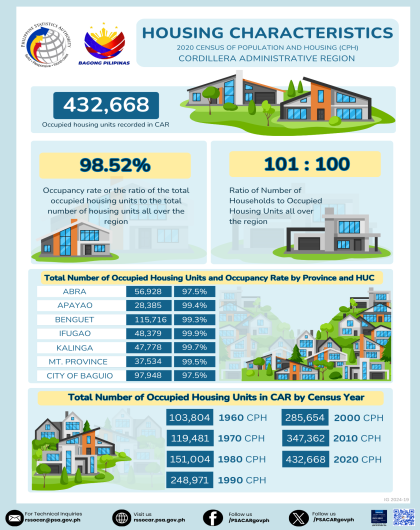| Census Years | Census Reference Date | Total |
| 2000 | May 1, 2000 | 140,631 |
| 2010 | May 1, 2010 | 154,187 |
| 2015 | August 1, 2015 | 154,590 |
| 2020 | May 1, 2020 | 158,200 |
The population of Mountain Province increased by 0.49 percent annually from 2015 to 2020. By comparison, the rate at which the population of the province grew from 2010 to 2015 was higher at just 0.05 percent. In 2000-2010, the PGR is at 0.92 percent. (Table 2)
Table 2. Annual Population Growth Rate, Mountain Province: 2000-2020
| Census Years | Annual Population Growth Rate |
|---|---|
| 2000-2010 | 0.92 |
| 2010-2015 | 0.05 |
| 2015-2020 | 0.49 |
Among the ten municipalities in the province, Bauko has the highest population in 2020 with 32,021 persons followed by Paracelis with 31,168, Bontoc with 24,104 and Tadian with 19,341. Same trend for these three municipalities is observed from census years 2000, 2010 and 2015.
The least populated municipalities are Barlig and Besao with 4,796 and 6,873 populations respectively. (Table 3)
Table 3. Total Population by Municipality, Mountain Province: 2000-2020
| Total Population | ||||
|---|---|---|---|---|
| Municipality | 2000 | 2010 | 2015 | 2020 |
| Barlig | 6,351 | 5,838 | 4,819 | 4,796 |
| Bauko | 27,729 | 30,172 | 31,065 | 32,021 |
| Besao | 10,067 | 7,818 | 7,040 | 6,873 |
| Bontoc | 22,308 | 23,980 | 24,643 | 24,104 |
| Natonin | 9,065 | 10,048 | 10,272 | 10,339 |
| Paracelis | 18,985 | 26,476 | 28,121 | 31,168 |
| Sabangan | 8,728 | 8,741 | 9,315 | 9,621 |
| Sadanga | 8,596 | 9,181 | 8,799 | 8,427 |
| Sagada | 10,728 | 11,244 | 11,127 | 11,510 |
| Tadian | 18,227 | 20,689 | 19,389 | 19,341 |
Paracelis is the fastest growing municipality in the province with an annual population growth rate (PGR) of 2.19 percent from 2015 to 2020. Same observation is recorded from census years 2000-2015. It is followed by Sagada with a PGR of 0.71 percent; Sabangan with 0.68 percent and Bauko with 0.64 percent. Natonin increased at a minimal rate with just 0.14 percent.
It is noted that the rest of the five municipalities posted a negative PGR from 2015-2020. These municipalities are: Barlig with -0.10 percent; Besao with -0.50 percent; Bontoc with -0.46 percent; Sadanga with -0.90 percent and Tadian with -0.05. This means that the population of these municipalities in 2015 is higher than that of 2020.
It is also observed that Barlig and Besao posted a uniform negative PGR from the past four census years. This means that the population of these two municipalities continued to decrease from 2000 to 2020. (Table 4).
Table 4. Annual Population Growth Rate by Municipality, Mountain Province: 2000-2020
| Annual Population Growth Rate | |||
|---|---|---|---|
| Municipality | 2000 - 2010 | 2010-2015 | 2015-2020 |
| Barlig | -0.84 | -3.58 | -0.10 |
| Bauko | 0.85 | 0.56 | 0.64 |
| Besao | -2.50 | -1.97 | -0.50 |
| Bontoc | 0.72 | 0.52 | -0.46 |
| Natonin | 1.03 | 0.42 | 0.14 |
| Paracelis | 3.38 | 1.15 | 2.19 |
| Sabangan | 0.01 | 1.22 | 0.68 |
| Sadanga | 0.66 | -0.81 | -0.90 |
| Sagada | 0.61 | -0.20 | 0.71 |
| Tadian | 1.27 | -1.23 | -0.05 |
Table 5. Top Ten Most Populous Barangays in Mountain Province: 2020
| Rank | Brangay | Municipality | Population |
|---|---|---|---|
| 1 | Poblacion | Paracelis | 6,786 |
| 2 | Bantay | Paracelis | 5,298 |
| 3 | Bontoc Ili | Bontoc | 4,642 |
| 4 | Monamon Sur | Bauko | 3,877 |
| 5 | Butigue | Paracelis | 3,402 |
| 6 | Samoki | Bontoc | 3,206 |
| 7 | Poblacion | Tadian | 3,200 |
| 8 | Bacarri | Paracelis | 3,156 |
| 9 | Palitod | Paracelis | 3,028 |
| 10 | Monamon Norte | Bauko | 2,967 |
| Rank | Brangay | Municipality | Population |
|---|---|---|---|
| 1 | Balintaugan | Bauko | 161 |
| 2 | Lacmaan | Besao | 184 |
| 3 | Ambagiw | Besao | 184 |
| 4 | Nacagang | Sagada | 200 |
| 5 | Lingoy | Barlig | 235 |
| 6 | Duagan | Tadian | 257 |
| 7 | Maducayan | Natonin | 257 |
| 8 | Macalana | Barlig | 273 |
| 9 | Besao East | Besao | 289 |
| 10 | Suquib | Besao | 293 |


